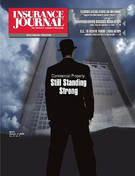In times of disaster the insurance industry is supposed to shine, and your industry did,” Alabama Insurance Commissioner Walter A. Bell commented during a panel discussion at the Society of Insurance Research annual conference in Atlanta. The discussion on “The Regulatory Environment — Untangle So You Can Work Smarter” was moderated by Ginger Johnson, Alfa Insurance director of compensation, and featured Bell, Georgia Commissioner John W. Oxendine and Louisiana Commissioner J. Robert Wooley.
“There are no more important issues than federal versus state regulations and proponents have dug in on both sides,” Bell explained.
He said if the industry was federally regulated, in effect companies would have to pay double taxes. Bell pointed out that insurance company revenue provides a majority of many states’ general fund income and that when companies resisted the double taxation those states would lose most of their budget.
“No one is more capable of goofing everything up than the federal government,” Georgia Insurance Commissioner John W. Oxendine agreed. “If the State Moderniza-tion and Regulatory Transparency Act (SMART) takes effect I’ll give up politics and become a rich trial lawyer.”
Oxendine maintained that the federal government shouldn’t interfere with family life and income and that if SMART proposals take effect trial attorneys will have a field day.
Wooley said he didn’t think the U.S. Congress will pass the SMART Act soon. He said that after Louisiana made an attempt to regulate insurance companies they began to leave the state and discovered the hard way that competition is the best way to regulate it.
Oxendine discussed credit scoring modeling, indicating that its reliability depends both on the credibility of the credit bureau and the reliability of the data used. “Garbage in, garbage out,” Oxendine commented.
He described the federal credit law as a scam. Oxendine said that Georgia is preparing new guidelines under which credit scoring would be only one factor.
If an applicant has a bad score, the agent needs someone to call, according to Oxendine. The Fair Credit Reporting Act requires the business to contact the company to verify that the report is accurate. But, that often doesn’t work because if the caller calls someone like Sears, they could easily verify that the customer is overdue on payments, when in reality the payment is either in the mail, or the check has been cashed, but has not been credited to the account.
If a charge is disputed, then it must be removed from the model and the insurance company would have to rerun the model without the disputed item and the vendor must show documentation to prove that the claim is valid.
According to Oxendine, a credit check is only required for new business, not renewals.
SMART Act scary
“There are no more important issues than federal versus state regulations and proponents have dug in on both sides,” Bell explained.
He said if the industry were federally regulated companies would have to pay double taxes. Bell pointed out that insurance company revenue provides a majority of the general fund income and that when companies resisted the double taxation those states would lose most of their budget.
Bell suggested that federal regulation would be similar to what happened in recent years in the savings and loan, mutual fund and securities industry debacles. He said such an act would result in double-taxation. But, that after a few years large insurance companies who went along with the act would decide to dispute the taxation and the states would lose their income.
“No member of any legislature can do anything without the support of other legislators,” Oxendine explained. “If we move insurance legislation to Washington, everybody will vote for everyone else’s proposals and the industry will be stuck with the results.”
Oxendine said that most federal agencies are set up to figure out only how to say “no” and rarely if ever say “yes.”
“Even the IRS helpline has a disclaimer saying, ‘Don’t rely on our advice,'” Oxendine explained. “That’s the federal government’s idea of helping someone.”
Commenting on how the system has worked in Louisiana, Woolsey said, “If there is an overbearing insurance regulator in one state, insurance companies can pull out temporarily, but with federal regulation you can’t pull out of America.
“You think the Czar of Russia was power hungry, just wait and see what happens with a federal insurance commissioner.”
Ease into rate increases
Oxendine criticized large insurance companies for their all-today-or-nothing attitude. He explained that insurance company statisticians wait until a they have a crisis and shortly thereafter expect to receive a 100 percent rate increase.
“Policyholders shouldn’t have to pay for insurance companies fallacies,” Oxendine explained. “They can’t be lazy, if they are they bring their problems on themselves.”
In Georgia, he said they do analyses every year and therefore insurance companies are expected to take care of their own house and know what is going on.
When a company comes him to Oxendine to suggest a rate increase, he said if it is 2 to 4 percent, he will not even look twice, up to perhaps a 5 percent maximum. If they request more than that, he pays more attention.
Oxendine said it is unrealistic for an insurance company to fall asleep for years and then to all of a sudden have a setback and attempt to increase rates 50 percent all at once. He said companies often ask for a year-to-year guarantee, which he is absurd.
Bell said that state insurance commissioners have a stated purpose: “To protect consumers and make sure the industry stays solvent.”
According to Wooley, his state’s rule should be “Come to Louisiana, prove you can lose money for three years and we will let you do business.”
He said that rate pricing affects availability; many companies come to Louisiana, discover they can’t make money and leave.
“Competition is the best way to regulate any industry,” Wooley said.
Tort chases away companies
Bell voiced his opposition to rate regulation and said that tort chases companies out of the state.
Oxendine said Georgia has a civil litigation system.
“Lawsuits shouldn’t be the policyholders’ private lottery system,” Oxnedine commented. “Without tort reform the consumer gets a settlement check for $50, while the lawyer gets a majority and is off somewhere playing on his yacht.”
All three commissioners agreed that educating the consumer and restraining misuse of existing laws by trial lawyers would be a big step toward balancing the system.
Topics Carriers Legislation Louisiana Georgia
Was this article valuable?
Here are more articles you may enjoy.


 US Roof Maintenance Lags: Hanover
US Roof Maintenance Lags: Hanover  Big ‘I’ Report: Independent Agency Channel Placed 62% of Premiums in 2023
Big ‘I’ Report: Independent Agency Channel Placed 62% of Premiums in 2023  Three Charged With Helping Agents Cheat on Florida Insurance License Exams
Three Charged With Helping Agents Cheat on Florida Insurance License Exams  As Rates Rise, Majority of Homeowners Say Insurance Industry Is in Crisis: Survey
As Rates Rise, Majority of Homeowners Say Insurance Industry Is in Crisis: Survey 


